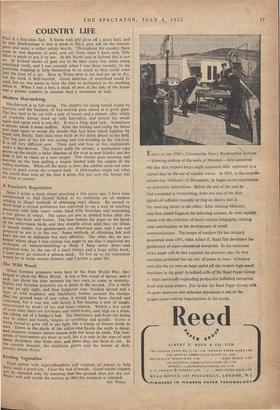The Wild Wood When German prisoners were here in the
First World War, they helped to plant the Black Wood. It was a fine wood of spruce, and it took just about the time between the two wars to come to maturity. Italian and German prisoners cut it down in the second. For a while it was an ugly sight; and then foxgloves rose, bracken spread and a tract of wild raspberry and blackberry bushes covered the stumps. Had the ground been of any value, it would have been cleared and cultivated, but it was not, and slowly it has become a sort of jungle, criss-crossed by tracks of fox and lesser animals. Within a few yards of each other there are fox-holes and rabbit-holes, and, high on a slope, the raking out of a badger's bed. The blackberry and briar are losing way to alders and hazels, tangles of woodbine and spindle. Gorse is being forced to grow tall to get light, but a clump of broom holds its own. Down in the shade of the alders and hazels the earth is damp, and whatever creature passes cannot help but leave its mark. The foot- prints of bird-nesters are there as well, but it is only in the tops of such dense shrubbery that birds nest, and there they are hard to see. In the caverns beneath, the stinkhorn grows and the insects of dark, Marshy places thrive.


























































 Previous page
Previous page